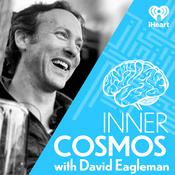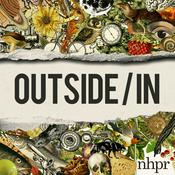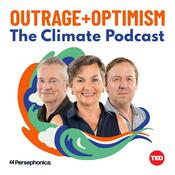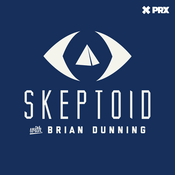218 episodes
Polina Dimova, "At the Crossroads of the Senses: The Synaesthetic Metaphor Across the Arts in European Modernism" (Penn State UP, 2024)
06/2/2026 | 1h 2 mins.Inspired by Richard Wagner’s idea of the total artwork, European modernist artists began to pursue multimedia projects that mixed colors, sounds, and shapes. Dr. Polina Dimova’s At the Crossroads of the Senses: The Synaesthetic Metaphor Across the Arts in European Modernism (Penn State UP, 2024) traces this new sensory experience of synaesthesia—the physiological or figurative blending of senses—as a modernist phenomenon from its scientific description in the late nineteenth century to its prevalence in the early twentieth.
Structured around twenty theses on synaesthesia, this book explores the integral relationship between modernist art, science, and technology, tracing not only how modernist artists perceptually internalized and absorbed technology and its effects but also how they appropriated it to achieve their own aesthetic, metaphysical, and social goals. Through case studies of prominent multimodal artists—Oscar Wilde, Aubrey Beardsley, Richard Strauss, Aleksandr Scriabin, Wassily Kandinsky, František Kupka, Andrei Bely, and Rainer Maria Rilke—At the Crossroads of the Senses reveals the color-forms and color-sounds that, for these artists, laid the foundations of the world and served as the catalyst for the flourishing exchanges among the arts at the fin de siècle.
Rooted in archival research in Russia, Germany, France, and the Czech Republic, At the Crossroads of the Senses taps overlooked scientific sources to offer a fresh perspective on European modernism. Sensory studies scholars, literary critics, and art and music historians alike will welcome its many contributions, not least among them a refreshing advocacy for a kind of sensuous reading practice.
This interview was conducted by Dr. Miranda Melcher whose book focuses on post-conflict military integration, understanding treaty negotiation and implementation in civil war contexts, with qualitative analysis of the Angolan and Mozambican civil wars. You can find Miranda’s interviews on New Books with Miranda Melcher, wherever you get your podcasts.
Learn more about your ad choices. Visit megaphone.fm/adchoices
Support our show by becoming a premium member! https://newbooksnetwork.supportingcast.fm/neuroscienceAndreas Killen, "Nervous Systems: Brain Science in the Early Cold War" (Harper, 2023)
01/2/2026 | 53 mins.In this eye-opening chronicle of scientific research on the brain in the early Cold War era, the acclaimed historian Andreas Killen traces the complex circumstances surrounding the genesis of our present-day fascination with this organ.
The 1950s were a transformative, even revolutionary decade in the history of brain science. Using new techniques for probing brain activity and function, researchers in neurosurgery, psychiatry, and psychology achieved dramatic breakthroughs in the treatment of illnesses like epilepsy and schizophrenia, as well as the understanding of such faculties as memory and perception. Memory was the site of particularly startling discoveries. As one researcher wrote to another in the middle of that decade, “Memory was the sleeping beauty of the brain—and now she is awake.” Collectively, these advances prefigured the emergence of the field of neuroscience at the end of the twentieth century.
But the 1950s also marked the beginning of the Cold War and a period of transformative social change across Western society. These developments resulted in unease and paranoia. Mysterious new afflictions—none more mystifying than “brainwashing”—also appeared at this time. Faced with the discovery that, as one leading psychiatrist put it, “the human personality is not as stable as we often assume,” many researchers in the sciences of brain and behavior joined the effort to understand these conditions. They devised ingenious and sometimes transgressive experimental methods for studying and proposing countermeasures to the problem of Communist mind control. Some of these procedures took on a strange life of their own, escaping the confines of the research lab to become part of 1960s counterculture. Much later, in the early 2000s, they resurfaced in the War on Terror.
These stories, often told separately, are brought together by the historian Andreas Killen in this chronicle of the brain’s mid-twentieth-century emergence as both a new research frontier and an organ whose integrity and capacities—especially that of memory—were imagined as uniquely imperiled in the 1950s. Nervous Systems: Brain Science in the Early Cold War (Harper, 2023) explores the anxious context in which the mid-century sciences of the brain took shape and reveals the deeply ambivalent history that lies behind our contemporary understanding of this organ.
Paul Lerner is Professor of History at the University of Southern California where he directs the Max Kade Institute for Austrian-German-Swiss Studies. He can be reached at [email protected] and @PFLerner.
Learn more about your ad choices. Visit megaphone.fm/adchoices
Support our show by becoming a premium member! https://newbooksnetwork.supportingcast.fm/neuroscienceSteve Ramirez, "How to Change a Memory: One Neuroscientist’s Quest to Alter the Past" (Princeton UP, 2025)
19/1/2026 | 50 mins.As a graduate student at MIT, Steve Ramirez successfully created false memories in the lab. Now, as a neuroscientist working at the frontiers of brain science, he foresees a future where we can replace our negative memories with positive ones. In How to Change a Memory, Ramirez draws on his own memories--of friendship, family, loss, and recovery--to reveal how memory can be turned on and off like a switch, edited, and even constructed from nothing.
A future in which we can change our memories of the past may seem improbable, but in fact, the everyday act of remembering is one of transformation. Intentionally editing memory to improve our lives takes advantage of the brain's natural capacity for change.
In How to Change a Memory: One Neuroscientist’s Quest to Alter the Past (Princeton UP, 2025), Ramirez explores how scientists discovered that memories are fluid--they change over time, can be erased, reactivated, and even falsely implanted in the lab. Reflecting on his own path as a scientist, he examines how memory manipulation shapes our imagination and sense of self. If we can erase a deeply traumatic memory, would it change who we are? And what would that change mean anyway? Throughout, Ramirez carefully considers the ethics of artificially controlling memory, exploring how we might use this tool responsibly--for both personal healing and the greater good.
A masterful blend of memoir and cutting-edge science, How to Change a Memory explores how neuroscience has reached a critical juncture, where scientists can see the potential of memory manipulation to help people suffering from the debilitating effects of PTSD, anxiety, Alzheimer's, addiction, and a host of other neurological and behavioral disorders.
Steve Ramirez has been featured on CNN, NPR, and the BBC and in leading publications such as The New York Times, National Geographic, Wired, Forbes, The Guardian, The Economist, and Nature. An award-winning neuroscientist who has given TED talks on his groundbreaking work on memory manipulation, he is associate professor of psychological and brain sciences at Boston University.
Caleb Zakarin is CEO and Publisher of the New Books Network.
Learn more about your ad choices. Visit megaphone.fm/adchoices
Support our show by becoming a premium member! https://newbooksnetwork.supportingcast.fm/neuroscienceJustin Gregg, "If Nietzsche Were a Narwhal: What Animal Intelligence Reveals About Human Stupidity" (Little, Brown, 2022)
18/1/2026 | 30 mins.What if human intelligence is actually more of a liability than a gift? After all, the animal kingdom, in all its diversity, gets by just fine without it. At first glance, human history is full of remarkable feats of intelligence, yet human exceptionalism can be a double-edged sword. With our unique cognitive prowess comes severe consequences, including existential angst, violence, discrimination, and the creation of a world teetering towards climate catastrophe. What if human exceptionalism is more of a curse than a blessing?
As Dr. Justin Gregg puts it in his book If Nietzsche Were a Narwhal: What Animal Intelligence Reveals About Human Stupidity (Little, Brown (US), 2022, Hodder (UK), 2023), there’s an evolutionary reason why human intelligence isn’t more prevalent in the animal kingdom. Simply put, non-human animals don’t need it to be successful. And, miraculously, their success arrives without the added baggage of destroying themselves and the planet in the process.
In seven mind-bending and hilarious chapters, Dr. Gregg highlights features seemingly unique to humans – our use of language, our rationality, our moral systems, our so-called sophisticated consciousness – and compares them to our animal brethren. What emerges is both demystifying and remarkable, and will change how you look at animals, humans, and the meaning of life itself.
This interview was conducted by Dr. Miranda Melcher whose doctoral work focused on post-conflict military integration, understanding treaty negotiation and implementation in civil war contexts, with qualitative analysis of the Angolan and Mozambican civil wars.
Learn more about your ad choices. Visit megaphone.fm/adchoices
Support our show by becoming a premium member! https://newbooksnetwork.supportingcast.fm/neuroscience- The human brain is perhaps the most intricate and fascinating object in the known universe. Through a mysterious process, the activity of billions of neurons within a few pounds of matter generates the unfathomable complexity of the mind.Lectures in Neuroscience is a conversational and accessible introduction to the brain. Beginning from basic elements of neuroscience, the acclaimed scientist Rafael Yuste guides readers through increasingly sophisticated topics, developing a unified framework for how the brain functions. He describes how the brain is organized and how it develops, how neurons operate and form neural circuits, and how these circuits function as neural networks to generate behavior and mental states.Yuste challenges the traditional view that the brain is an input-output machine that reacts reflexively to sensory stimuli. Instead, he argues, the purpose of the brain is to make a predictive model of the world in order to anticipate the future and choose successful courses of action. He gives readers insight into the workings of sensory and motor systems and the neurobiological basis of our perceptions, thoughts, emotions, memories, and consciousness.Peppered with anecdotes and illustrated with elegant drawings and diagrams, this succinct and cohesive book is accessible to readers without previous background in the subject. It is written for anyone seeking to grasp the core principles of neuroscience or looking for a fresh and clear perspective on how the brain works.
Learn more about your ad choices. Visit megaphone.fm/adchoices
Support our show by becoming a premium member! https://newbooksnetwork.supportingcast.fm/neuroscience
More Science podcasts
Trending Science podcasts
About New Books in Neuroscience
This podcast is a channel on the New Books Network. The New Books Network is an academic audio library dedicated to public education. In each episode you will hear scholars discuss their recently published research with another expert in their field.
Discover our 150+ channels and browse our 28,000+ episodes on our website: newbooksnetwork.com
Subscribe to our free weekly Substack newsletter to get informative, engaging content straight to your inbox: https://newbooksnetwork.substack.com/
Follow us on Instagram and Bluesky to learn about more our latest interviews: @newbooksnetwork
Support our show by becoming a premium member! https://newbooksnetwork.supportingcast.fm/neuroscience
Podcast websiteListen to New Books in Neuroscience, Radiolab and many other podcasts from around the world with the radio.net app
Get the free radio.net app
- Stations and podcasts to bookmark
- Stream via Wi-Fi or Bluetooth
- Supports Carplay & Android Auto
- Many other app features
Get the free radio.net app
- Stations and podcasts to bookmark
- Stream via Wi-Fi or Bluetooth
- Supports Carplay & Android Auto
- Many other app features

New Books in Neuroscience
Scan code,
download the app,
start listening.
download the app,
start listening.






































